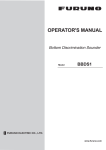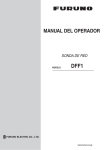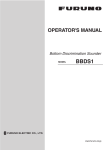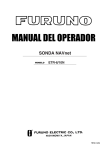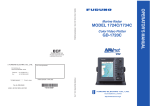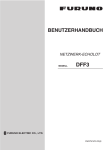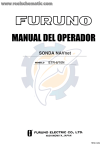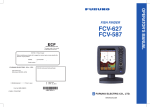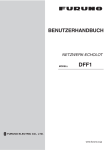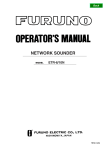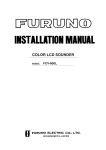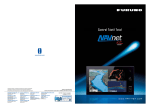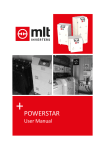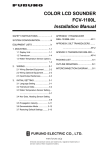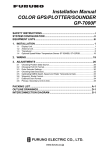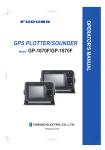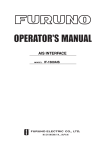Download DFF1 Operator`s Manual E1 6-27-12
Transcript
OPERATOR'S MANUAL NETWORK SOUNDER MODEL DFF1 www.furuno.com IMPORTANT NOTICES General • This manual has been authored with simplified grammar, to meet the needs of international users. • The operator of this equipment must read and follow the descriptions in this manual. Wrong operation or maintenance can cancel the warranty or cause injury. • Do not copy any part of this manual without written permission from FURUNO. • If this manual is lost or worn, contact your dealer about replacement. • The contents of this manual and equipment specifications can change without notice. • The example screens (or illustrations) shown in this manual can be different from the screens you see on your display. The screens you see depend on your system configuration and equipment settings. • Save this manual for future reference. • Any modification of the equipment (including software) by persons not authorized by FURUNO will cancel the warranty. • All brand and product names are trademarks, registered trademarks or service marks of their respective holders. How to discard this product Discard this product according to local regulations for the disposal of industrial waste. For disposal in the USA, see the homepage of the Electronics Industries Alliance (http://www.eiae.org/) for the correct method of disposal. How to discard a used battery Some FURUNO products have a battery(ies). To see if your product has a battery, see the chapter on Maintenance. Follow the instructions below if a battery is used. Tape the + and - terminals of battery before disposal to prevent fire, heat generation caused by short circuit. In the European Union The crossed-out trash can symbol indicates that all types of batteries must not be discarded in standard trash, or at a trash site. Take the used batteries to a battery collection site according to your national legislation and the Batteries Directive 2006/66/EU. Cd In the USA The Mobius loop symbol (three chasing arrows) indicates that Ni-Cd and lead-acid rechargeable batteries must be recycled. Take the used batteries to a battery collection site according to local laws. In the other countries Ni-Cd Pb There are no international standards for the battery recycle symbol. The number of symbols can increase when the other countries make their own recycle symbols in the future. i SAFETY INSTRUCTIONS The user and installer must read the appropriate safety instructions before attempting to install or operate the equipment. WARNING Indicates a potentially hazardous situation which, if not avoided, could result in death or serious injury. CAUTION Indicates a potentially hazardous situation which, if not avoided, may result in minor or moderate injury. Warning, Caution Prohibitive Action Mandatory Action Safety instructions for the operator WARNING WARNING Do not open the equipment. Do not operate the equipment with wet hands. Only qualified personnel should work inside the equipment. Electrical shock can result. Do not disassemble or modify the equipment. Do not place liquid-filled containers on the top of the equipment. Fire, electrical shock or serious injury can result. Electrical shock can result. Turn off the equipment immediately if it is emitting smoke or fire. Do not install the network sounder unit where it may be subjected to rain or water splash. Fire or electrical shock can result if the power is left on. Fire or electrical shock can result if water gets inside the equipment. Turn off the power immediately if water leaks into the equipment or an object is dropped inside the equipment. Use the proper fuse. WARNING Use of a wrong fuse can damage the equipment and may cause fire. Continued use can cause fire or electrical shock. A warning label is attached to the equipment. Do not remove these labels. If a label is missing or illegible, contact a FURUNO agent or dealer about replacement. Turn off the power immediately if you feelthe equipment is acting abnormally. If the equipment is very warm or is emitting strange noises turn off the power immediately and contact your dealer for advice. WARNING Name: Warning Label (1) To avoid electrical shock, Type: 86-003-1011-2 do not remove cover. No user-serviceable parts Code No.: 100-236-232 ii Safety instructions for the installer WARNING CAUTION The transducer cable must be handled carefully, following the guidelines below. Do not open the equipment. Only qualified personnel should work inside the equipment. • Keep fuels and oils away from the cable. • Locate the cable away from chemicals. • Locate the cable away from locations where it might be damaged. Turn off the power before beginning the installation. Fire or electrical shock can result if the power is left on. Do not turn on the power with the transducer exposed to air. Confirm that is no water leakage at the transducer and temperature sensor. Damage to the transducer may result. WARNING Observe the following compass safe distances to prevent interference to a magnetic compass: Water leakage can sink the vessel. Also, confirm that neither the transducer or sensor will loosen by vibration. The installer is solely responsible for the installation. Confirm that the power supply voltage is within the rating of this equipment. Incorrect voltage will damage the equipment and may cause fire. iii Standard compass Steering compass 0.30 m 0.30 m TABLE OF CONTENTS SYSTEM CONFIGURATION ........................................................................................... v 1. MOUNTING ................................................................................................................. 1 1.1 Equipment Lists ..................................................................................................................1 1.2 Network Sounder................................................................................................................2 1.3 Transducer 520-5PSD, 520-5MSD.....................................................................................3 1.3.1 Mounting location .......................................................................................................3 1.3.2 Acceptable mounting locations ..................................................................................4 1.3.3 Installation procedure ................................................................................................4 1.4 Transducer 525-5PWD (transom mount) ...........................................................................6 1.4.1 Installation for flat hulls...............................................................................................6 1.4.2 Installation for deep-V hulls........................................................................................7 1.4.3 Transducer preparation..............................................................................................7 1.5 Inside Hull Mount................................................................................................................8 1.5.1 Necessary tools..........................................................................................................8 1.5.2 Remarks on installation..............................................................................................8 1.5.3 Selecting the mounting location .................................................................................8 1.5.4 Installation procedure.................................................................................................9 1.6 Optional Water Temperature Sensor ST-02MSB, ST-02PSB ..........................................10 1.7 Optional Temperature Sensors ........................................................................................11 1.7.1 Transom mount temperature sensor T-02MTB........................................................11 1.7.2 Thru-hull temperature sensor T-02MSB, T-03MSB .................................................12 1.8 Optionial Triducers ...........................................................................................................13 1.8.1 Thru-hull triducer 525STID-MSD..............................................................................13 1.8.2 Transom mount triducer 525STID-PWD ..................................................................13 2. WIRING...................................................................................................................... 19 2.1 Optional Temperature/Speed Sensor, Temperature Sensor ............................................20 2.2 Wiring Optional 1 kW Transducer.....................................................................................21 3. INITIAL SETTINGS, OPERATION ............................................................................ 22 3.1 Selecting the Transmission Power ...................................................................................22 3.2 MODE SW ........................................................................................................................23 3.3 Operation Check (LED) ....................................................................................................24 4. MAINTENANCE......................................................................................................... 25 4.1 Maintenance .....................................................................................................................25 4.2 Replacing the Fuse...........................................................................................................26 PACKING LIST ............................................................................................................ A-1 OUTLINE DRAWINGS ................................................................................................ D-1 INTERCONNECTION DIAGRAM ................................................................................ S-1 iv SYSTEM CONFIGURATION This sounder can be connected to NavNet/NavNet vx2*, NavNet 3D (MFD8/12/BB) and NavNet TZtouch (TZT9/14). Network Sounder DFF1 NavNet series Radar Plotter NavNet series Radar Plotter HUB* Radar Plotter Radar Plotter Rectifier PR-62 Matching Box MB-1100 12-24 VDC 1 kW 100/110/220/230 VAC, 1f, 50/60 Hz Transducer 520-5PSD 525-5PWD 520-5MSD Transducer 50B-6/6B 50B-9B Speed/temperature sensor ST-02MSB ST-02PSB Temperature Triducer 525STID-MSD sensor 525STID-PWD T-02MTB T-02MSB T-03MSB Transducer 200B-5S Transducer 50/200-1T 50/200-12M Note: Use only 600 W/1 kW transducer. Use of other types will damage the transducer. *: HUB may be connected to 3 sets of NavNet radar or plotter. : Standard supply : Optional supply : External equipment * Model 17x2 Series, Model 17x2C Series, Model 17x4 Series, Model 17x4C Series, GD-1720, GD1720C, Model 18x3C(-BB) Series, Model 18x4C(-BB) Series, Model 19x3C(-BB) Series, Model 19x4C(-BB) Series, GD-1900C(-BB), GD-1920C(-BB) v 1. MOUNTING 1.1 Equipment Lists Standard supply Name Network Sounder Spare Parts Installation Materials Type DFF1 SP02-05201 CP02-08100 Code No. 001-007-860 000-010-153 Qty 1 1 set 1 set Remarks Fuse Power cable, LAN cable, Self-tapping screws Optional supply Name Matching Box Cable Assy. Type MB-1100 MJ-A6SPF0017-010C MJ-A6SPF0017-100C MJ-A6SPF0017-200C MJ-A6SPF0017-300C MJ-A6SRMD/TM11AP8-005 MOD-Z072-020+ MOD-Z072-100+ Inner Hull Kit S 22S0191-2 Triducer 525STID-MSD 525STID-PWD Transducer 520-5PSD 520-5PWD 520-5MSD 50B-6 50B-6B 50B-9B 200B-5 200B-5S 50/200-1T 50/200-12M Speed/Tempera- ST-02MSB ture Sensor ST-02PSB Temperature T-02MTB Sensor T-02MSB T-03MSB Cable Assy. 02S4147 Code No. 000-041-353 000-159-704-11 000-159-706-11 000-159-707-11 000-159-708-11 000-144-463 000-167-175-10 000-167-177-10 000-802-598 000-011-783 000-011-784 000-015-204 000-015-126 000-015-212 000-015-042 000-015-043 000-015-065 000-015-027 000-015-029 000-015-170 000-015-171 000-137-986 000-137-987 000-040-026 000-040-040 000-040-027 000-141-082 Rectifier 000-013-484 000-013-485 000-013-486 For Speed/Temp sensor, Temp. sensor 100 VAC 110 VAC 220 VAC 000-013-487 230 VAC PR-62 Remarks For 1 kW 1 m, for NavNet 10 m, for NavNet 20 m, for NavNet 30 m, for NavNet For HUB 2 m, HUB-101 10 m, HUB-101 Thru-hull mount, metallic Transom mount, plastic Thru-hull mount, plastic Transom mount, plastic Thru-hull mount, metallic 10 m, 1 kW 15 m, 1 kW 15 m, 1 kW 10 m, 1 kW 10 m, 1 kW 10 m, 1 kW 10 m Thru-hull mount, metallic Thru-hull mount, plastic Transom mount Thru-hull mount Note: Use only 600 W/1 kW transducer. Use of other types will damage the transducer. 1 Network Sounder The network sounder can be installed on a desktop, deck or on a bulkhead. When selecting a mounting location for the network sounder, keep the following in mind: • The temperature and humidity should be moderate and stable. • Locate the unit away from exhaust pipes and vents. • The mounting location should be well ventilated. • Mount the unit where shock and vibration are minimal. • Keep the unit away from electromagnetic field-generating equipment such as motors and generators. • Leave slack in cables for maintenance and servicing ease. • A magnetic compass will be affected if the network sounder is placed too close to it. Observe the compass safe distances noted in the safety instructions to prevent disturbance to the magnetic compass. R2 2-Ø5 FIXING HOLES 230±1 255 # MORE THAN 70 # MORE THAN 85 144±1 219 Ø12 12 5 .5 • Fasten the network sounder to the mounting location with four self-tapping screws (4×20). 44 1.2 90 # MORE THAN 70 NOTE: The DFF1 is not waterproofed. Mount the unit so that the cable entrance does NOT face upward, to reduce the chance of water leakage into the unit. 2 1.3 Transducer 520-5PSD, 520-5MSD 1.3.1 Mounting location .The performance of this sounder is directly related to the mounting location of the transducer, especially for high-speed cruising. The installation should be planned in advance, keeping the standard cable length and the following factors in mind: • When the boat has a keel, the transducer should be at least 15-30 cm away from it. Typical thru-hull mountings are shown in the figure on the next page. • Air bubbles and turbulence caused by movement of the boat seriously degrade the sounding capability of the transducer. The transducer should, therefore, be located in a position where water flow is the smoothest. Noise from the propellers also adversely affects performance and the transducer should not be mounted nearby. The lifting strakes are notorious for creating acoustic noise, and these must be avoided by keeping the transducer inboard of them. • The transducer must always remain submerged, even when the boat is rolling, pitching or up on a plane at high speed. • A practical choice would be somewhere between 1/3 and 1/2 of the boat's length from the stern. For planing hulls, a practical location is generally rather far astern, so that the transducer is always in water regardless of the planing attitude. 22 120 24 All dimensions in millimeters 120 28 30 68 Ship's bow 87 68 520-5MSD 520-5PSD Dimensions of transducers 520-5PSD, 520-5MSD 3 1.3.2 Acceptable mounting locations Deep-V hull * Position 1/2 to 1/3 length of the hull from stern. * 15-30 cm from center line (inside first lifting strakes). Transducer mounting location on deep-V hull High speed V-planing hull * Within the wetted bottom area * Deadrise angle within 15° Transducer mounting location on high speed V-planing hull 4 1.3.3 Installation procedure 1. With the boat hauled out of the water, mark the location selected for mounting the transducer on the bottom of the hull. If the hull is not level within 15° in any direction, fairing blocks made out of teak should be used between the transducer and hull, both inside and outside, to keep the transducer face parallel with the water line. Fabricate the fairing block as shown below and make the entire surface as smooth as possible to provide an undisturbed flow of water around the transducer. The fairing block should be smaller than the transducer itself to provide a channel to divert turbulent water around the sides of the transducer rather than over its face. BOW Hole for stuffing tube Upper half Lower half Saw along slope of hull. Construction of fairing block 2. Drill a hole just large enough to pass the threaded stuffing tube of the transducer through the hull, making sure it is drilled vertically. 3. Apply a sufficient amount of high quality caulking compound to the top surface of the transducer, around the threads of the stuffing tube and inside the mounting hole (and fairing blocks if used) to ensure watertight mounting. 4. Mount the transducer and fairing blocks and tighten the locking nuts. Be sure that the transducer is properly oriented and its working face is parallel to the water line. Flat washer Rubber washer Fairing block Hull bottom Hull bottom Deep-V Hull Flat Hull Note: Do not over-stress the stuffing tube and locking nuts through excessive tightening, since the wood block will swell when the boat is placed in the water. It is suggested that the nut be tightened lightly at installation and retightened several days after the boat has been launched. 5 1.4 Transducer 525-5PWD (transom mount) This type of mounting is very commonly employed for outboard motor boats. Do not use this method on an inboard motor boat because turbulence is created by the propeller ahead of the transducer. There are two methods of installation: flush with hull (for flat hulls) and projecting from hull (for deep V-hulls). Flat Hull Deep V-hull Transom mount transducer mounting locations 1.4.1 Installation for flat hulls A suitable mounting location is at least 50 cm away from the engine and where the water flow is smooth. 1. Drill four pilot holes in the mounting location. 2. Attach the transducer to the bracket with self-tapping screws (supplied). 3. Adjust the transducer position so the transducer faces right to the seabed. Note: If necessary, to improve water flow and minimize air bubbles staying on the transducer face, incline the transducer about 5° at the rear. This may require a certain amount of experimentation for fine tuning at high cruising speeds. 4. Fill the gap between the wedge front of the transducer and transom with epoxy material to eliminate any air spaces. M5x20 Tape Transom mount transducer, mounting flush with hull 6 1.4.2 Installation for deep-V hulls This method is employed on deep-V hulls and provides good performance because the effects of air bubbles are minimal. Install the transducer parallel with water surface; not flush with hull. If the boat is placed on a trailer care must be taken not to damage the transducer when the boat is hauled out of the water and put on the trailer. M5x20 M5x20 No.2 M5x14 Transom mount transducer, projecting from hull 1.4.3 Transducer preparation Before putting the boat in water, wipe the face of the transducer thoroughly with a detergent liquid soap. This will lessen the time necessary for the transducer to have good contact with the water. Otherwise the time required for complete "saturation" will be lengthened and performance will be reduced. Note: Do not paint the transducer. Performance will be affected. 7 1.5 Inside Hull Mount This mounting method is available for FRP boats. 1.5.1 Necessary tools You will need the following tools: • Sandpaper (#100) • Silicone sealant • Silicone grease 1.5.2 Remarks on installation • Turn off the engine and anchor the boat while installing the equipment. • Install the transducer in the engine room. 1.5.3 Mounting location Keep the following points in mind when selecting a mounting location: • The mounting location should be where the hull is of single-hull thickness and is void of air or flotation materials other than solid fiberglass between the transducer face and the water. • Do not place the transducer over hull struts or ribs which run under the hull. • Avoid a location where the rising angle of the hull exceeds 15°, to minimize the effect of the boat's rolling. • You will finalize the mounting location through some trial and error. The procedure for this is shown later. Center line 50cm 50cm 1/2 1/3 15cm 15cm Mounting location for transducer Inside-hull transducer mounting location 8 1.5.4 Installation procedure 1. Clean the transducer face to remove any foreign material. Lightly roughen the transducer face with #100 sandpaper. Also, roughen the inside of the hull where the transducer is to be mounted. 2. Warm the silicone sealant to 40°C before usage to soften it. Coat the transducer face and mounting location with silicone sealant. Transducer face Silicone sealant Coating the transducer face with silicone sealant 3. Press the transducer firmly down on the hull and gently twist it back and forth to remove any air which may be trapped in the silicone sealant. Twist to squeeze out air bubbles. Silicone sealant Hull Attaching transducer to hull with silicone sealant 4. Connect this unit to NavNet equipment and turn on the NavNet equipment. 5. Set up the NavNet equipment to show “single frequency display”. 6. Set the gain to “50”. 7. Set the range to “10”. Case 1 The installation is proper if the bottom echo is displayed in red and the depth indication is shown. Go to step 9. Case 2 The bottom echo is not displayed in red when ultrasound attenuation is great. Relocate the transducer as shown in step 8 8. Re-locating the transducer. 1) Turn off the power. 2) Detach the transducer. Insert a knife or wooden stick under transducer to remove it 3) Repeat steps 1 thru 7. 9. Fix the transducer. 9 1.6 Optional Water Temperature Sensor ST-02MSB, ST-02PSB Select a suitable mounting location considering the following points: • Select a mid-boat flat position. The sensor does not have to be installed perfectly perpendicular. The sensor must not be damaged in dry-docking operation. • Select a place apart from equipment generating heat. • Select a place in the forward direction viewing from the drain hole, to allow for circulation of cooling water. • Select a place free from vibration. Procedure 1. Dry-dock the boat. 2. Make a hole of approx. 51 mm in diameter in the mounting location. 3. Unfasten locknut and remove the sensor section. 4. Apply high-grade sealant to the flange of the sensor. 5. Pass the sensor casing through the hole. 6. Face the notch on the sensor toward boat's bow and tighten the flange. 7. Set the sensor section to the sensor casing and tighten the locknut. 8. Launch the boat and check for water leakage around the sensor. Locknut Face "notch" toward bow. Flange nut Coat with silicone sealant. 51 123 Brim φ77 Speed/Temperature sensor ST-02MSB, ST-02PSB 10 1.7 Optional Temperature Sensors 1.7.1 Transom mount temperature sensor T-02MTB • Fix the cable at a convenient location with cable clamp. • When the cable is led in through the transom board, make a hole of approx. 17 mm in diameter to pass the connector. After passing the cable, fill the hole with a sealing compound. D>50cm D M5x20 Mount sensor flush with hull bottom. Temperature sensor T-02MTB 11 1.7.2 Thru-hull temperature sensor T-02MSB, T-03MSB Select a suitable mounting location considering the following points: • Select a mid-boat flat position. The sensor does not have to be installed perfectly perpendicular. However, the location should not be such that the transducer may be damaged when the boat is dry-docked. • Locate away from equipment which gives off heat. • Locate away from drain pipes. • Select a location where vibration is minimal. Sensor Holder Sensor Cable Locknut Locknut Washer Rubber Gasket Locknut Washer Rubber Gasket φ21 mm Apply sealant. Apply sealant. Thicker than 25 mm Holder Guide T-02MSB T-03MSB Assembling temperature sensor T-02MSB, T-03MSB 12 1.8 Optional Triducers 1.8.1 Thru-hull triducer 525STID-MSD See section 1.2 for how to install the 525STID-MSD. φ79 mm 133 mm 2.00°㩷㪄㪈㪉㪬㪥 Thread φ51 mm 27 mm 1.8.2 7 mm 140 mm Unit: mm Transom mount triducer 525STID-PWD Pre-test for speed and temperature Connect the sensor to the instrument and spin the paddlewheel. Check for a speed reading and the approximate air temperature. If there is no reading, return the sensor to your place of purchase. Tools and materials needed • Scissors • Masking tap • Safety goggles • Dust mask • Electric drill • Drill bit for: - Bracket holes: 4mm, #23, or 9/64" - Fiberglass hull: chamfer bit (preferred), 6mm, or 1/4" - Transom hole: 19mm or 3/4" (optional) - Cable clamp holes: 3mm or 1/8" • Screwdrivers 13 • Straight edge • Marine sealant • Pencil • Zip-ties • Water-based antifouling paint (mandatory in salt water). Mounting location To ensure the best performance, the sensor must be submerged in aeration-free and turbulence-free water. Mount the sensor close to the centerline of the boat. On slower heavier displacement hulls, positioning it farther from the centerline is acceptable. Allow adequate space above the bracket for it to release and rotate the sensor upward. Height without speed sensor 191mm (7-1/2") Height Height with speed sensor 213mm (8-1/2") Height required at mounting location Note 1: Do not mount the sensor in an area of turbulence or bubbles: near water intake or discharge openings; behind strakes, struts, fittings, or hull irregularities; behind eroding paint (an indication of turbulence). Note 2: Avoid mounting the sensor where the boat may be supported during trailering, launching, hauling, and storage. Note 3: For single drive boat, mount on the starboard side at least 75 mm (3") beyond the swing radius of the propeller. 75 mm (3") minimum beyond swing radius Mounting location on single drive boat Note 4: For twin drive boat, mount between the drives. 14 Installation of bracket 1. Cut out the installation template (enclosed with transducer) along the dotted line. 2. At the selected location, position the template, so the arrow at the bottom is aligned with the bottom edge of the transom. Being sure the template is parallel to the waterline, tape it in place. Align template vertically. Deadrise angle Slope of hull parallel to waterline Align template arrow with bottom edge of transom. Positioning the template Warning: Always wear safety goggles and a dust mask. 3. Using a 4 mm, #23, or 9/64" bit, drill three holes 22 mm (7/8") deep at the locations indicated. To prevent drilling too deeply, wrap masking tape around the bit 22 mm (7/8") from the point. Fiberglass hull: Minimize surface cracking by chamfering the gelcoat. If a chamfer bit or countersink bit is not available, start drilling with a 6mm or 1/4" bit to a depth of 1 mm (1/16"). 4. If you know your transom angle, the bracket is designed for a standard 13° transom angle. 11°-18° angle: No shim is required. Skip to step 3 in "Adjusting". Other angles: The shim is required. Skip to step 2 of "Adjusting". If you do not know the transom angle, temporarily attach the bracket and sensor to the transom to determine if the plastic shim is needed. 5. Using the three #10 x 1-1/4" self-tapping screws, temporarily screw the bracket to the hull. DO NOT tighten the screws completely at this time. Follow the step 1-4 in "Attaching the sensor to the bracket", before proceeding with "Adjusting". 15 Attaching the sensor to the bracket 1. If the retaining cover near the top of the bracket is closed, open it by depressing the latch and rotating the cover downward. Step 1 Step 2 Latch Pivot arm (2) Retaining cover Step 3 Slot (2) Step 4 Attaching the sensor to the bracket 2. Insert the sensor's pivot arms into the slots near the top of the bracket. 3. Maintain pressure until the pivot arms click into place. 4. Rotate the sensor downward until the bottom snaps into the bracket. 5. Close the retaining cover to prevent the accidental release of the sensor when the boat is underway. Adjusting 1. Using a straight edge, sight the underside of the sensor relative to the underside of the hull. The stern of the sensor should be 1-3 mm (1/16-1/8") below the bow of the sensor or parallel to the bottom of the hull. Note: Do not position the bow of the sensor lower than the stern because aeration will occur. 2. To adjust the sensor's angle relative to the hull, use the tapered plastic shim provided. If the bracket has been temporarily fastened to the transom, remove it. Key the shim in place on the back of the bracket. 2°-10° transom angle (stepped transom and jet boats): Position the shim with the tapered end down. 16 19°-22° transom angle (small aluminum and fiberglass boats): Position the shim with the tapered end up. 2°-10° 11° transom angle transom NO SHIM angle 19°-22° transom angle shim with taper up shim with taper down YES YES YES parallel parallel parallel 12°-18° transom angle NO SHIM YES NO angle reversed slight angle NO angle too steep Sensor position and transom angle 3. If the bracket has been temporarily fastened to the transom, remove it. Apply a marine sealant to the threads of the three #10 x 1-1/4" self-tapping screws to prevent water seeping into the transom. Screw the bracket to the hull. Do not tighten the screws completely at this time. 4. Repeat step 1 to ensure that the angle of the sensor is correct. Note: Do not position the sensor farther into the water than necessary to avoid increasing drag, spray, and water noise and reducing boat speed. 5. Using the vertical adjustment space on the bracket slots, slide the sensor up or down to provide a projection of 3 mm (1/8”). Tighten the screws. Cable cover Cable clamp 50 mm (2") Hull projection 3 mm (1/8") Vertical adjustment and cable routing 17 Cable routing Route the sensor cable over the transom, through a drain hole, or thorough a new hole drilled in the transom above the waterline. Never cut the cable or remote the connector; this will void the warranty. Always wear safety goggles and a dust mask. 1. If a hole must be drilled, choose a location well above the waterline. Check for obstructions such as trim tabs, pumps, or wiring inside the hull. Mark the location with a pencil. Drill a hole through the transom using a 19 mm or 3/4" bit (to accommodate the connector). 2. Route the cable over or through the transom. 3. On the outside of the hull secure the cable against the transom using the cable clamps. Position a cable clamp 50 mm (2") above the bracket and mark the mounting hole with a pencil. 4. Position the second cable clamp halfway between the first clamp and the cable hole. Mark this mounting hole. 5. If a hole has been drilled in the transom, open the appropriate slot in the transom cable cover. Position the cover over the cable where it enters the hull. Mark the two mounting holes. 6. At each of the marked locations, use a 3 mm or 1/8" bit to drill a hole 10 mm (3/8") deep. The prevent drilling too deeply, wrap masking tape around the bit 10 mm (3/ 8") from the point. 7. Apply marine sealant to the threads of the #6 x 1/2" self-tapping screw to prevent water from seeping into the transom. If you have drilled a hole through the transom, apply marine sealant to the space around the cable where it passes through the transom. 8. Position the two cable clamps and fasten them in place. If used, push the cable cover over the cable and screw it in place. 9. Route the cable to the instrument being careful not to tear the cable jacket when passing it though the bulkhead(s) and other parts of the boat. To reduce electrical interference, separate the sensor cable from other electrical wiring and "noise" sources. Coil any excess cable and secure it in place with zip-ties to prevent damage. 18 2. WIRING Connect the power cable, transducer cable, external equipment and ground wire as shown in the figure below. DFF1 XDR NETWORK 12-24 VDC 1.1-0.4 A 3 GND 1+ MODE SW 1 2 3 4 2 - MOD-Z072-050+, 5 m (option: 2/10 m) HUB-101 GROUND WIRE IV-1.25sq MOD-WPAS0001-030+, 3 m (for MFD8/12/BB /TZT9/14, standard supply) MFD8/12/BB, TZT9/14 GROUND MJ-A6SPF0017 (option: 1/5/10/20/30 m) Black NavNet, NavNet vx2 White Shield (green) TRANSDUCER BATTERY 12-24 VDC DFF1, rear view Ground Connect the ground wire (1.25sq) to ship's ground to prevent interference to the picture. Shorten the ground wire as much as possible. For FRP vessels, install a ground plate that measures about 20 cm by 30 cm on the outside of the hull bottom to provide a ground point. CAUTION Ground the equipment to prevent mutual interference. Note: Use a "closed-type" lug ( ) to make the ground connection at the network sounder. Do not use an "open-type" lug ( ). External KP Consult with your dealer if connection of an external KP is required to reduce interference from another transducer. 19 2.1 Optional Temperature/Speed Sensor, Temperature Sensor Connect the temperature/speed sensor or temperature sensor to the XDR port with the converter connector (Type: 02S4147, Code No.: 000-141-082, option). MJ-A6SRMD MJ-A10SPF SHIELD TEMP TEMP0V/SPD0V SPD +V NC 1 2 3 4 5 6 NC NC NC NC NC NC NC XDR+ XDR SHIELD XDR- 1 2 3 4 5 6 7 8 9 10 Temperature sensor OR Temperature/ speed sensor MJ-A10SRMD Transducer 4 7 3 1 2 5 6 8 9 10 TEMP TEMP0V SPD0V/ SHIELD SPD +V XDR port on the NC DFF1 NC XDR+ XDR SHIELD XDR- Connection of temperature/speed sensor Connect to XDR port at network sounder MJ-A10SPF MJ-A6SRMD MJ-A10SRMD Tape connector with self-vulcanizing tape and then vinyl tape to waterproof connector. Bind tape end with cable tie. Temperature, Speed/temperature Transducer connector sensor connector Connection of transducer, temperature sensor, speed/temperature sensor 20 2.2 Wiring Optional 1 kW Transducer To connect optional transducer 50B-6, 50B-6B, 50B-9B, 200B-5, 200B-5S, 50/200-1T or 50/200-12M, the optional Matching Box MB-1100 is required. 02P6168 50kHz J2 50B-6/6B 50B-9B SHIELD J1 TB2 1 BLK 200kHz Jumper block setting J2: Full power output J1: Reduced power output RED BLK RED TB1 2 3 3 2 4 1 Shield WHT BLK 5 200B-5S 50/200-1T or 50/200-12M TO NETWORK SOUNDER (Cable is fitted with 8P connector. 8P-10P converter connector is required.) TB2 (SHIELD) (BLK) (BLU) (GRN) (RED) 1 2 3 4 5 50K 200K Common Common Matching Box MB-1100 Matching Box Kit (Type: MB-1100, Code No.: 000-041-353) Name Type Code No. Qty Matching Box MB-1100 000-041-000 1 Crimp-on Lug FV1.25-3 Red 000-538-113 6 Cord Lock NC-1 000-516-650 1 Remarks Cable w/8P connector supplied for connection to network sounder For use with separate transducer Fabrication of transducer cable Fabricate the transducer cable as illustrated below to connect it to the Distribution Box. Vinyl sheath Crimp-on lug FV1.25-3, Red Clamp here. Shield Taping Vinyl tube Fabrication of transducer cable 21 3. INITIAL SETTINGS, OPERATION WARNING Do not open the equipment unless totally familiar with electrical circuits and service manual. Only qualified personnel should work inside the equipment. 3.1 Selecting the Transmission Power The default transmission power is 600 W. If the 1 kW transducer is installed, turn on the #1 segment of DIP SW S2 on the pcb 02P6353 inside the network sounder. For NavNet/NavNet vx2 1. Detach the power cable. 2. Detach the cover of the DFF1; grasp the cover at opposing sides with hands, pull outward slightly and lift up to detach. 3. Loosen three screws fixing the inside cover, and slide cover forward to detach it. 4. Set the #1 segment of DIP SW S2 according to transducer connected. OFF 02P6353 4 3 2 1 J17 ON 600 kW transducer S2 OFF LAN connector 4 3 2 1 ON 1 kW transducer PCB 02P6353 5. Close the inside and outside covers and connect the power cable. For NavNet 3D/TZtouch: Set the transducer type at the NavNet 3D/TZtouch. See respective installation manual for the procedure. 22 3.2 MODE SW The MODE switch provides the functions described in the table below. Remove the rubber cap to access the switch and set switches with a plastic screwdriver or the like. XDR MODE SW 1 2 3 4 ON NETWORK 12-24 VDC 1.1-0.4 A 3 GND 1+ 2 1 2 3 4 #1: ON #2: OFF #3: OFF #4: ON OFF ON ALL OFF OFF ON 1 2 3 4 1 NavNet/NavNet vx2/NavNet TZtouch MODE switch settings 2 3 4 NavNet 3D MODE switch settings Description of MODE SW SW No. 1 (Default:ON) Function, description Setting content Power from NavNet OFF: Sounder powered on/off by NavNet ON: Sounder not powered on/off by NavNet 2 (Default: OFF) IP number (Currently no use) OFF: IP0 ON: IP1 3 (Default: OFF) Factory testing OFF: Testing OFF ON: Testing ON 4 (Default: ON) Automatic IP setting (Currently no use) OFF: Automatic IP enabled ON: Automatic IP disabled For NavNet 3D, turn off all switches. 23 3.3 Operation Check (LED) The network sounder is powered on/off from ship’s switchboard. The LED on the network sounder lights or flashes according to equipment state, as described in the table below. LED state Meaning Lighting continuously* NavNet is not showing the sounder display, or sounder is not connected to NavNet Flashing every two seconds Normal operation Flashing every four seconds Factory test mode * The LED lights for approximately 20 seconds after turning on the power while the equipment is being initialized. LED DFF1, top view 24 4. MAINTENANCE WARNING Do not open the equipment unless totally familiar with electrical circuits and service manual. Only qualified personnel should work inside the equipment. 4.1 Maintenance Regular maintenance is essential for good performance. Check the items listed in the table below monthly to help keep your equipment in good shape for years to come. Checking Item Action Transducer cable Check that cable is tightly fastened and is not damaged. Replace if damaged. Power cable, transducer cable plug Check that they are tightly fastened and not damaged. Refasten if necessary. Replace if damaged. Ground Check for corrosion. Clean if necessary. Power supply voltage Check voltage. If out of rating correct problem. Cleaning the network sounder’s cabinet Dust or dirt on the cabinet may be removed with a dry cloth. Do not use chemical-based cleaners to clean the cabinet; they can remove paint and markings. Transducer Marine life on the transducer face will result in a gradual decrease in sensitivity. Check the transducer face for cleanliness each time the boat is dry-docked. Carefully remove any marine life with a piece of wood or fine-grade sandpaper. 25 4.2 Replacing the Fuse The two 3 A fuses (Type: FGBO-A 125V 3A PBF, Code No. 000-155-850-10) in the snap-in fuse holder on the power cable protect the equipment from equipment fault and reverse polarity of the ship's mains. If the equipment cannot be powered, a fuse may have blown. Find out the cause for blown fuse before replacing a fuse. If a fuse blows again after replacement, contact a FURUNO agent or dealer for advice. WARNING Use the proper fuse. Use of a wrong fuse can result in damage to the equipment or cause fire. 26 FURUNO DFF1 SPECIFICATIONS OF THE NETWORK SOUNDER DFF1 1. GENERAL 1.1. Output Power 600 W/ 1 kW rms nominal, 1 kW requires optional MB-1100 1.2. TX Frequency 50 kHz or 200 kHz, 50/200 kHz exchangeable 1.3. Amplifier type Wide dynamic linear amp (double superheterodyne) 1.4. Network protocol Ethernet 100/10BASE-TX 1.5. Depth Range and Pulse Repetition Rate Range (m) PRR ( /min.) 2 3000 5 3000 10 1990 40 485 100 195 200 95 400 65 1200 34 2. POWER SUPPLY 12-24 VDC: 1.1-0.4 A (at 1 kW output) 3. ENVIRONMENTAL CONDITION 3.1. Ambient Temperature -15°C to +55°C 3.2. Relative Humidity 93% at 40°C 3.3. Dustproofing, waterproofing IP20 (not waterproof) (IEC60529) 3.4. Vibration (IEC 60945 Ed4) - 2-5 Hz and up to 13.2 Hz with an excursion of ±1 mm ±10 % (7 m/s2 maximum acceleration at 13.2 Hz) - 13.2-100 Hz with a constant maximum acceleration of 7 m/s2 4. COATING COLOR 4.1. Main Unit N3.0 SP - 1 E2036S01A PACKING LIST 02GB-X-9851 -5 DFF1-J/E A-1 N A M E ユニット 1/1 O U T L I N E DESCRIPTION/CODE № Q'TY UNIT ネットワーク魚探 1 DFF1 NETWORK SOUNDER 000-010-154-00 予備品 SPARE PARTS SP02-05201 ヒューズ 2 FGBO-A 125V 3A PBF GLASS TUBE FUSE 000-155-850-10 工事材料 INSTALLATION MATERIALS CP02-08100 ケーブル(組品)LAN 1 MOD-Z072-050+ LAN CABLE ASSEMBLY 000-167-176-10 ケーブル組品MJ 1 MJ-A3SPF0028-035C POWER CABLE ASSY. 000-164-952-10 +トラスタッピンネジ 1シュ 4 4X20 SUS304 SELF-TAPPING SCREW 000-158-850-10 図書 DOCUMENT 取扱説明書 OPERATOR'S MANUAL 1 OM*-20360-* 000-170-908-1* ** コ-ド番号末尾の[**]は、選択品の代表コードを表します。 CODE NUMBER ENDING WITH "**" INDICATES THE CODE NUMBER OF REPRESENTATIVE MATERIAL. 型式/コード番号が2段の場合、下段より上段に代わる過渡期品であり、どちらかが入っています。 なお、品質は変わりません。 TWO TYPES AND CODES MAY BE LISTED FOR AN ITEM. THE LOWER PRODUCT MAY BE SHIPPED IN PLACE OF THE UPPER PRODUCT. QUALITY IS THE SAME. (略図の寸法は、参考値です。 DIMENSIONS IN DRAWING FOR REFERENCE ONLY.) C2036-Z01-E D-1 D-2 C B A 1 2 3 1 2 3 4 5 NOTE *1: SHIPYARD SUPPLY. *2: OPTION. *3: FITTED AT FACTORY. *4: CHANGE JUMPER SETTING OF DFF1. *5: CHANGE DIP SWITCH SETTING OF DFF1. *1 IV-1.25sq. *1 IV-1.25sq. MB-1100 整流器 RECTIFIER PR-62 *2 5 6 注記 *1)造船所手配。 50/200 -1T/12M *2)オプション。 *3)工場にて取付済み。 *4)DFF1のジャンパー設定変更が必要。 *5)DFF1のDIPスイッチ設定変更が必要。 100/110/ 220/230VAC, 1φ,50/60Hz 12-24VDC ネットワーク魚探 NETWORK SOUNDER DFF1 *3 12-24VDC MJ-A3SPF J1 1 (+) シロ WHT 2 (-) クロ BLK 3 SHIELD ミドリ GRN 3 2 1 *4 5 2 1 4 3 MB-1100 (1kW) 16/Feb/2012 DWG.No. SCALE kg Y.NISHIYAMA H.MAKI 02-158-1001-3 520ST-PWD 524ST-MSD 525STID-MSD 525STID-PWD 水温・船速センサー付 送受波器 TRANSDUCER W/ SENSOR *2 4 E_RD_P E_RD_N E_TD_P E_TD_N NC SHIELD 指示部 DISPLAY UNIT (NAVNET:NAV1,VX2) E_TD_P マルチファンクションディスプレイ E_TD_N MULTI FUNCTION DISPLAY E_RD_P MFD8/12/BB SW_P または OR SW_N スイッチングハブ E_RD_N SWITCHING HUB PWR_SW_P HUB-101 *2 PWR_SW_N (TZT9/14) *5 *2 *3 *3 RJ-45 MJ-A6SPF0017-050C, MJ-A6SPF 1/10/20/30m,φ6 1 1 P 2 2 3 3 4 4 P 5 5 6 6 7 8 REF.No. J5 TXP TXN RXP P_SW_P P_SW_N RXN NC NC T.YAMASAKI MASS 3 *3 *3 RJ-45 RJ-45 MOD-Z072,5m,φ6(2/10m:OPTION) 1 P 2 3 4 P P 5 6 7 P 8 C2036-C01- J 14/Feb/2012 CHECKED 14/Feb/2012 APPROVED DRAWN 50B-6/6B 200B-5S 50B-9B 1 2 3 4 5 6 7 8 520-5PSD 520-5MSD 520-5PWD 送受波器 TRANSDUCER *2 NETWORK J5 TXP TXN RXP P_SW_P P_SW_N RXN NC NC 8m MJ-A3SPF0028-035C 3.5m *1 DPYC-1.5 TB2 XDR *3 MJ-A10SPF *3 MJ-A10SPF 1 2 3 4 5 6 7 8 9 10 FUSE 3A 1m TB1 1 TB2 XDR-P XDR-SHIELD XDR-M 8 9 10 クロ BLK アカ RED XDR XDR J4 SPD_XDR +12V SPD/TD_ID_0V TEMP_XDR TD_ID_XDR NC TEMP_0V XDR_P XDR SHIELD XDR_M クロ BLK アカ RED J4 *3 MJ-A10SPF 2 MJ-A10SPF 02S4147 *2 NAME 名称 TITLE 相互結線図 NETWORK SOUNDER INTERCONNECTION DIAGRAM DFF1 ネットワーク魚探 *2 520-5PSD 520-5MSD 520-5PWD 送受波器 TRANSDUCER T-02MTB または ST-02MSB T-03MSB ST-02PSB OR *2 T-02MSB *2 温度センサー 水温・船速センサー TEMP/SPEED SENSOR TEMP SENSOR 6 *3 MJ-A6SPF MJ-A6SRMD 1 2 3 4 5 6 1 2 3 4 5 6 7 8 9 10 *3 MJ-A6SPF 1 (+) (-) GND BLK BLU GRN RED クロ アオ ミドリ アカ 10m MJ-A10SRMD *3 MJ-A10SPF 1 2 3 4 5 XDR J4 SPD_XDR +12V SPD/TD_ID_0V TEMP_XDR TD_ID_XDR NC TEMP_0V XDR_P XDR SHIELD XDR_M 1 2 3 4 5 6 7 8 9 10 8 9 10 1 S-1 FURUNO Worldwide Warranty for Pleasure Boats (Except North America) This warranty is valid for products manufactured by Furuno Electric Co. (hereafter FURUNO) and installed on a pleasure boat. Any web based purchases that are imported into other countries by anyone other than a FURUNO certified dealer may not comply with local standards. FURUNO strongly recommends against importing these products from international websites as the imported product may not work correctly and may interfere with other electronic devices. The imported product may also be in breach of the local laws and mandated technical requirements. Products imported into other countries as described previously shall not be eligible for local warranty service. For products purchased outside of your country please contact the national distributor of Furuno products in the country where purchased. This warranty is in addition to the customer´s statutory legal rights. Warranty repairs carried out by companies/persons other than a FURUNO national distributor or a certified dealer is not covered by this warranty. 6. Warranty Limitations When a claim is made, FURUNO has a right to choose whether to repair the product or replace it. The FURUNO warranty is only valid if the product was correctly installed and used. Therefore, it is necessary for the customer to comply with the instructions in the handbook. Problems which result from not complying with the instruction manual are not covered by the warranty. FURUNO is not liable for any damage caused to the vessel by using a FURUNO product. The following are excluded from this warranty: 1. Terms and Conditions of Warranty FURUNO guarantees that each new FURUNO product is the result of quality materials and workmanship. The warranty is valid for a period of 2 years (24 months) from the date of the invoice, or the date of commissioning of the product by the installing certified dealer. a. Second-hand product b. Underwater unit such as transducer and hull unit c. Routine maintenance, alignment and calibration services. d. Replacement of consumable parts such as fuses, lamps, recording papers, drive belts, cables, protective covers and batteries. d. Magnetron and MIC with more than 1000 transmitting hours or older than 12 months, whichever comes first. e. Costs associated with the replacement of a transducer (e.g. Crane, docking or diver etc.). f. Sea trial, test and evaluation or other demonstrations. g. Products repaired or altered by anyone other than the FURUNO national distributor or an authorized dealer. h. Products on which the serial number is altered, defaced or removed. i. Problems resulting from an accident, negligence, misuse, improper installation, vandalism or water penetration. j. Damage resulting from a force majeure or other natural catastrophe or calamity. k. Damage from shipping or transit. l. Software updates, except when deemed necessary and warrantable by FURUNO. m. Overtime, extra labour outside of normal hours such as weekend/holiday, and travel costs above the 160 KM allowance n. Operator familiarization and orientation. 2. FURUNO Standard Warranty The FURUNO standard warranty covers spare parts and labour costs associated with a warranty claim, provided that the product is returned to a FURUNO national distributor by prepaid carrier. The FURUNO standard warranty includes: Repair at a FURUNO national distributor All spare parts for the repair Cost for economical shipment to customer 3. FURUNO Onboard Warranty If the product was installed/commissioned and registered by a certified FURUNO dealer, the customer has the right to the onboard warranty. The FURUNO onboard warranty includes • • • • Free shipping of the necessary parts Labour: Normal working hours only Travel time: Up to a maximum of two (2) hours Travel distance: Up to a maximum of one hundred and sixty (160) KM by car for the complete journey 4. Warranty Registration For the Standard Warranty - presentation of product with serial number (8 digits serial number, 1234-5678) is sufficient. Otherwise, the invoice with serial number, name and stamp of the dealer and date of purchase is shown. For the Onboard Warranty your FURUNO certified dealer will take care of all registrations. 5. Warranty Claims For the Standard Warranty - simply send the defective product together with the invoice to a FURUNO national distributor. For the Onboard Warranty – contact a FURUNO national distributor or a certified dealer. Give the product´s serial number and describe the problem as accurately as possible. FURUNO Electric Company, March 1, 2011 FURUNO Warranty for North America FURUNO U.S.A., Limited Warranty provides a twenty-four (24) months LABOR and twenty-four (24) months PARTS warranty on products from the date of installation or purchase by the original owner. Products or components that are represented as being waterproof are guaranteed to be waterproof only for, and within the limits, of the warranty period stated above. The warranty start date may not exceed eighteen (18) months from the original date of purchase by dealer from Furuno USA and applies to new equipment installed and operated in accordance with Furuno USA’s published instructions. Magnetrons and Microwave devices will be warranted for a period of 12 months from date of original equipment installation. Furuno U.S.A., Inc. warrants each new product to be of sound material and workmanship and through its authorized dealer will exchange any parts proven to be defective in material or workmanship under normal use at no charge for a period of 24 months from the date of installation or purchase. Furuno U.S.A., Inc., through an authorized Furuno dealer will provide labor at no cost to replace defective parts, exclusive of routine maintenance or normal adjustments, for a period of 24 months from installation date provided the work is done by Furuno U.S.A., Inc. or an AUTHORIZED Furuno dealer during normal shop hours and within a radius of 50 miles of the shop location. A suitable proof of purchase showing date of purchase, or installation certification must be available to Furuno U.S.A., Inc., or its authorized dealer at the time of request for warranty service. This warranty is valid for installation of products manufactured by Furuno Electric Co. (hereafter FURUNO). Any purchases from brick and mortar or web-based resellers that are imported into other countries by anyone other than a FURUNO certified dealer, agent or subsidiary may not comply with local standards. FURUNO strongly recommends against importing these products from international websites or other resellers, as the imported product may not work correctly and may interfere with other electronic devices. The imported product may also be in breach of the local laws and mandated technical requirements. Products imported into other countries, as described previously, shall not be eligible for local warranty service. For products purchased outside of your country please contact the national distributor of Furuno products in the country where purchased. WARRANTY REGISTRATION AND INFORMATION To register your product for warranty, as well as see the complete warranty guidelines and limitations, please visit www.furunousa.com and click on “Support”. In order to expedite repairs, warranty service on Furuno equipment is provided through its authorized dealer network. If this is not possible or practical, please contact Furuno U.S.A., Inc. to arrange warranty service. FURUNO U.S.A., INC. Attention: Service Coordinator 4400 N.W. Pacific Rim Boulevard Camas, WA 98607-9408 Telephone: (360) 834-9300 FAX: (360) 834-9400 Furuno U.S.A., Inc. is proud to supply you with the highest quality in Marine Electronics. We know you had several choices when making your selection of equipment, and from everyone at Furuno we thank you. Furuno takes great pride in customer service. FURUNO ELECTRIC CO., LTD. 9-52 Ashihara-Cho, Nishinomiya City, 662-8580, Hyogo, Japan Tel: +81 798-65-2111 Fax: +81 798-65-4200 Pub NO. DOC-912 EC Declaration of Conformity We FURUNO ELECTRIC CO., LTD. ----------------------------------------------------------------------------------------------------------------------(Manufacturer) 9-52 Ashihara-Cho, Nishinomiya City, 662-8580, Hyogo, Japan ----------------------------------------------------------------------------------------------------------------------(Address) declare under our sole responsibility that the product Network sounder Type DFF1 ----------------------------------------------------------------------------------------------------------------------(Model name, serial number) to which this declaration relates is in conformity with the following standard(s) or other normative document(s) IEC 60945 Third edition: 1994-11 – Clause 10.2 and 10.3 IEC 60945 Fourth edition: 2002-08 – Clauses 9.2, 9.3, 10.3, 10.4, 10.5, 10.8 and 10.9 ----------------------------------------------------------------------------------------------------------------------(title and/or number and date of issue of the standard(s) or other normative document(s)) For assessment, see • EMC Test Report FLI 12-06-062 of 11 December 2006 prepared by Furuno Labotech International Co., Ltd. This declaration is issued according to the Council Directive of 3 May 1989 on the approximation of the laws of the Member States relating to electromagnetic compatibility (89/336/EEC). On behalf of Furuno Electric Co., Ltd. Nishinomiya City, Japan December 12, 2006 ---------------------------------------------(Place and date of issue) Hiroaki Komatsu Manager, International Rules and Regulations -----------------------------------------------------------------(name and signature or equivalent marking of authorized person) This page is intentionally left blank . The paper used in this manual is elemental chlorine free. ・FURUNO Authorized Distributor/Dealer 9-52 Ashihara-cho, Nishinomiya, 662-8580, JAPAN All rights reserved. Printed in Japan A : FEB . 2007 E1 : JUN . 27, 2012 Pub. No. OME-20360-E1 (YOTA ) DFF1 *00016495714* *00016495714* * 0 0 0 1 6 4 9 5 7 1 4 *













































